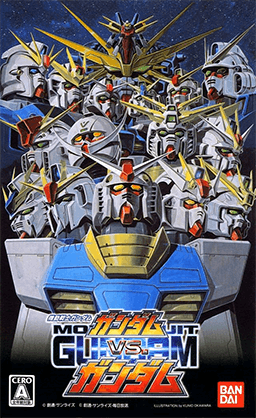Mobile Suit Gundam: Gundam vs. Gundam
| Mobile Suit Gundam: Gundam vs. Gundam | |
|---|---|
|
Artwork for the PlayStation Portable edition. | |
| Developer(s) | Capcom |
| Publisher(s) | Namco Bandai Games |
| Designer(s) | Atsushi Tomita |
| Platform(s) | Arcade, PlayStation Portable |
| Release date(s) |
|
| Genre(s) | Shooting |
| Mode(s) | Single-player, Multiplayer |
| Arcade system | System 256 |
Mobile Suit Gundam: Gundam vs. Gundam is an arcade game that newly crossover with other Gundam in Gundam Vs. series. The game features up to 30 different Mobile Weapons, and a play system similar to previous titles in the Gundam Vs. series.
Bandai Namco released a PlayStation Portable version on November 20, 2008. The sequel, Mobile Suit Gundam: Gundam vs. Gundam Next was released on March 18, 2009.
Background
Unlike the previous series that are set up in the same general universe (Universal Century or Cosmic Era), the background of this game is set up in the real gaming world in 2030, which the Gundam vs. Series produced many spin-offs for each series at that time. The Devil Gundam has somehow invaded into the game systems and merge the different worlds into one. In order to restore the order of the game nature, various heroes from different Gundam Series are joined together to fight against the Devil Gundam.
The game currently featured all timelined TV, OVA and movie productions as far as Mobile Suit Gundam 00 (but with the only exception of New Mobile Report Gundam Wing: Endless Waltz). Though most of the units are leading Gundams, a few non-gundam type units (mostly piloted by leading rivals) are also selectable. Battlefields are made from the general image of the production, rather than reforming the battlefield scene in the animation.
System Changes
Cost System: Each team has 6000 points. Unlike the previous series, the game reduced the classes of costs into only three - 1000, 2000, and 3000. Also, if player's unit cost is higher than the remaining team points when respawn, the armour point also decreases proportionally (which called as "Cost-over")
Support Unit: Each unit has their own respective support unit, most of them act as a supporting attacker and attack the opponent actively, but a few of them (like Gun-EZ in Victory Gundam) will also act as a shield unless players launches an attack or time has passed. Unlike most of the normal weapons, Support Unit cannot be reloaded unless the player's unit is destroyed.
G-Crossover: The Power-up system since Zeta Series has changed from enhancement to a large area attack system. Every title has their own G-Crossover attacks, which mostly feature a mass destruction weapon (e.g.: Destroy Gundam) or operations (e.g.: Colony Drop) related to the production.
Weapons and Alternate Units: Through the button combinations are similar to previous series, but many units can switch between weapons (mostly changes from a beam rifle to a beam cannon or else) Some of them can even change to an enhanced mobile suit, for example, the Gundam Mark II can be transformed into the Super Gundam, and the Strike Gundam could switch to Aile/Sword/Launcher Striker Packs. Weapons are not bounded when using a charging attack. Along with the standard attacks, like Double Zeta's Hi-Mega Cannon, and the finishing moves of God/Master Gundam. Some special attacks/effects can be used only in special conditions, Zeta Gundam's Bio-sensor, which gives two special attacks, will be activated for a short time only when the teammate being destroyed. For the Gundam Virsago, Gundam Ashtaron (in mobile armour mode) is treated as a weapon rather than a playable/support unit.
Background Music
Although vocal theme songs (and sometimes insert songs) are featured in previous series. Almost all the title features a full-vocal theme song as their BGM this time, perhaps inspired by the Another Century's Episode Series. However, Zeta Gundam did not feature a theme song due to its complicated copyright issue, even they had one in Zeta Vs. series, they used a standard BGM instead. Mobile Suit Gundam 00 did not include their background music. They will stick to any other titles', or maps' background music in versus mode.
References
External links
- Official Site (Japanese)
